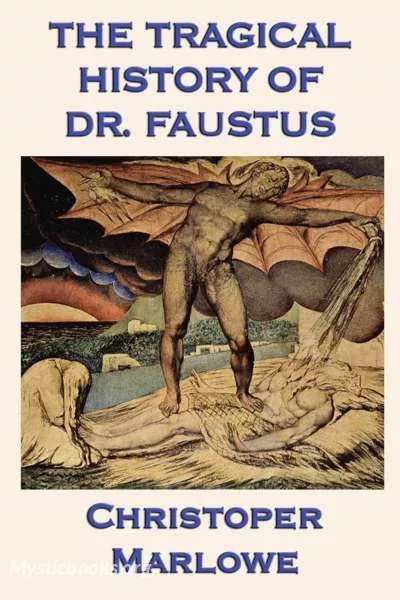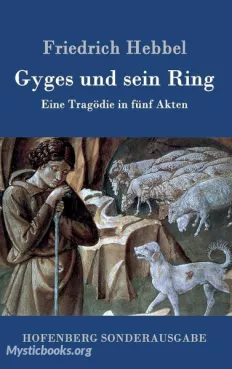
The Tragical History of Doctor Faustus
'The Tragical History of Doctor Faustus' Summary
In the prologue, the Chorus introduces the story of Faustus to the readers. He is described as being "base of stock"; however, his intelligence and scholarship eventually earns him the degree of a Doctor at the University of Wittenberg. During this opening, the reader also gets a first clue to the source of Faustus's downfall. Faustus's tale is likened to that of Icarus, who flew too close to the sun and fell to his death when the sun melted his waxen wings. This is a hint to Faustus's end as well as bringing to the reader's attention the idea of hubris (excessive pride), which is represented in the Icarus story and ultimately Faustus'.
Faustus comments that he has mastered every subject he has studied. He depreciates Logic as merely being a tool for arguing; Medicine as being unvalued unless it allowed raising the dead and immortality; Law as being mercenary and beneath him; and Divinity as useless because he feels that all humans commit sin, and thus to have sins punishable by death complicates the logic of Divinity. He dismisses it as "What doctrine call you this? Que sera, sera" (What will be, shall be).
Faustus instructs his servant Wagner to summon Valdes and Cornelius, a famous witchcrafter and a famous magician, respectively. Two angels, called the Good Angel and the Bad Angel, appear to Faustus and dispense their own perspectives of his interest in magic and necromancy. Though Faustus seems momentarily dissuaded, he is apparently won over by the Bad Angel, proclaiming, "How am I glutted with conceit of this" ("conceit" meaning the possibilities magic offers to him). Valdes and Cornnelius declare that if Faustus devotes himself to magic, great things are indeed possible with someone of Faustus' learning and intelligence.
Faustus' absence is noted by two scholars who are less accomplished than Faustus himself. They request that Wagner reveal Faustus' present location, a request which Wagner at first haughtily denies, then bombastically reveals. The two scholars worry about Faustus being corrupted by the art of Magic and leave to inform the rector of the university.
That night, Faustus begins his attempt to summon a devil in the presence of Lucifer and other devils (although Faustus is unaware of their presence). After he creates a magic circle and speaks an incantation through which he revokes his baptism, a demon (a representative of the devil himself) named Mephistophilis appears before him, but Faustus is unable to tolerate the hideous looks of the demon and commands it to change its appearance. Faustus, seeing the obedience of the demon in changing its form, takes pride in his skill. He tries to bind the demon to his service, but is unable to because Mephistophilis already serves Lucifer, who is also called the Prince of Devils. Mephistophilis also reveals that it was not Faustus' power that summoned him but rather his abjuration of scriptures that results in the Devil coming in the hope of claiming Faustus' soul.
Mephistophilis introduces the history of Lucifer and the other devils while indirectly telling Faustus that Hell has no circumference nor limit and is more of a state of mind than a physical location. Faustus' inquiries into the nature of hell lead to Mephistophilis saying: "Oh, Faustus, leave these frivolous demands, which strikes a terror to my fainting soul".
Book Details
Language
EnglishOriginal Language
Early Modern EnglishPublished In
1592Authors

Christopher Marlowe
England
Christopher Marlowe, also known as Kit Marlowe was an English playwright, poet and translator of the Elizabethan era. Modern scholars count Marlowe among the most famous of the Elizabethan playwrights...
Books by Christopher MarloweDownload eBooks
Listen/Download Audiobook
Related books

The Changeling by Thomas Middleton
The Changeling is a Jacobean tragedy written by Thomas Middleton and William Rowley. Widely regarded as being among the best tragedies of the English...

Salome by Oscar Wilde
Salome is a one-act tragedy by Oscar Wilde. The original 1891 version of the play was in French; an English translation was published three years late...

Dandy Dick by Arthur Wing Pinero
Dandy Dick is a Victorian farce by Arthur Wing Pinero, renowned for its witty dialogue and humorous situations. It follows the antics of a group of ch...

Arms and the man by George Bernard Shaw
It’s 1885, and Raina’s bourgeois Bulgarian family is caught up in the heady patriotism of their war with Serbia. The beautiful and headstrong Raina ea...

Shakespeare Monologues Collection vol. 11 (Multilingual) by William Shakespeare
This is the eleventh collection of monologues from Shakespeare's various plays. Various characters will speak on various topics, some of these teach a...

Shakespeare Monologues Collection vol. 10 (Multilingual) by William Shakespeare
This is the tenth collection of monologues from Shakespeare’s plays. Containing 20 parts.

The Widowing of Mrs Holroyd by D. H. Lawrence
The Widowing of Mrs. Holroyd is a play by the English writer D. H. Lawrence. It was written in 1911 and the revised version was published in 1914 by D...

Gyges und sein Ring by Friedrich Hebbel
Tauchen Sie ein in die faszinierende Welt von "Gyges und sein Ring" von Friedrich Hebbel, einem zeitlosen Drama, das die Grenzen von Macht, Moral und...

Club da Má Língua by Fyodor Dostoyevsky
“O Clube da Má Língua” satiriza a hipocrisia e a superficialidade da sociedade russa do século XIX. A obra retrata um grupo de indivíduos, liderados...

Orra by Joanna Baillie
"Orra is a young woman who is cursed with the power of second sight. She can see into the future, but her visions are often dark and disturbing. Orra...
Reviews for The Tragical History of Doctor Faustus
No reviews posted or approved, yet...